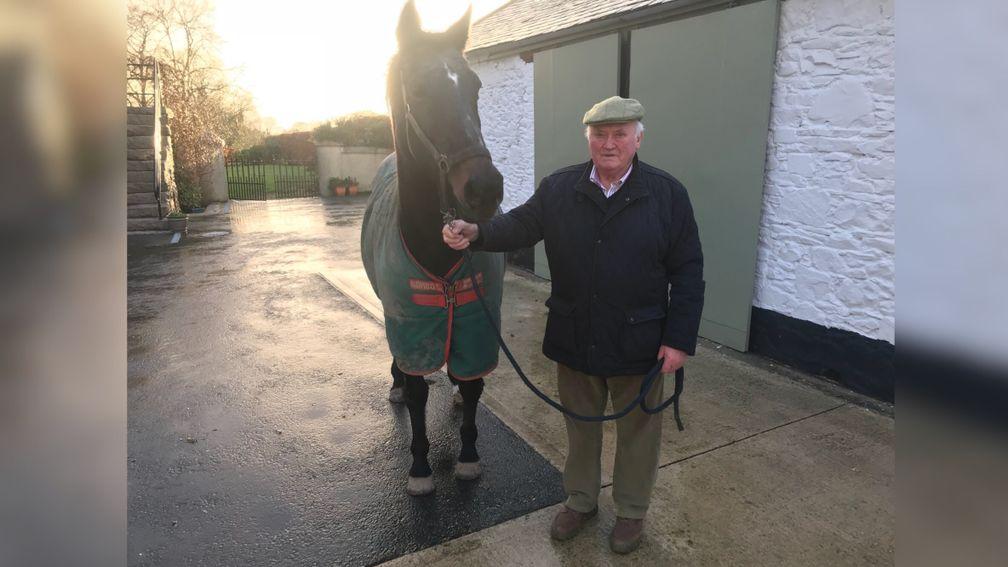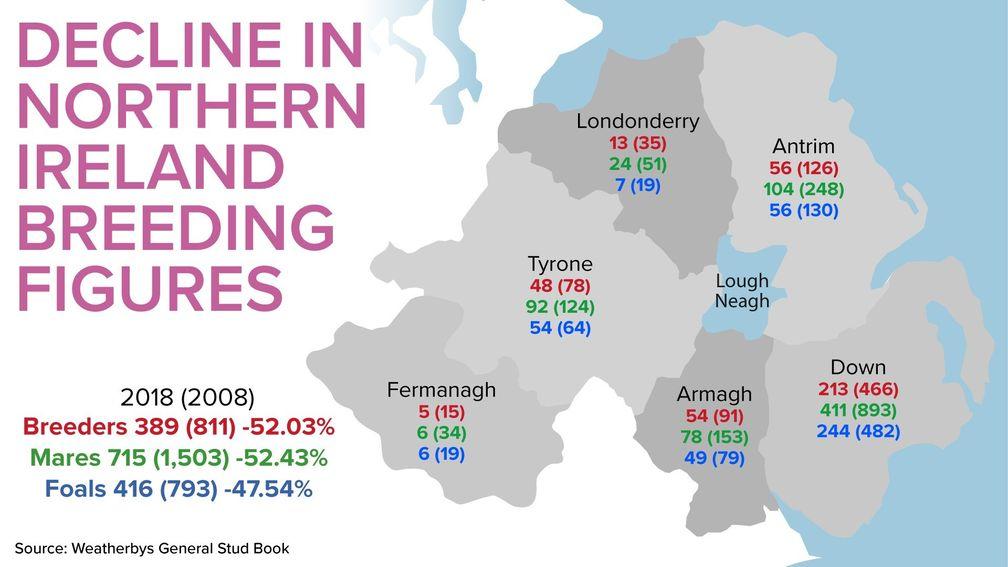Brexit uncertainty and anger among industry figures north of the border
Ollie O'Donoghue gauges opinion in the breeding world as leaving day looms

Breeders and consignors based in Northern Ireland continue to produce more than their fair share of high-class horses, but speaking to individuals as the March 29 date at which the United Kingdom is due to leave the European Union draws close, there is deep concern about the continued health of the industry in the region.
The establishment of a hard border appears to be considered a worst-case scenario, with memories of hours spent waiting at crossings in the past informing present views about the possible implications of a no-deal Brexit.
On the racecourse, however, horses bred in Northern Ireland have continued to shine, with last year's Caulfield Cup hero Best Solution bred by Cecil and Martin McCracken, who live in close proximity to Fred Mackey, the breeder of reigning Gold Cup winner Native River.
Mackey continues a fine tradition of National Hunt breeding in the North with the 2013 Gold Cup winner Bobs Worth bred by Lois Eadie in County Fermanagh and the 2000 hero Looks Like Trouble bred by Stephen Reel.
Other winners of the Gold Cup bred in Northern Ireland include Little Owl (1981), Silver Buck (1982) and The Thinker (1987), while three to succeed in the Grand National at Aintree are the Noel King-bred Bindaree (2002), Rhyme 'N' Reason (1988) and Little Polveir (1989).
Besides those already mentioned, the annual Irish Thoroughbred Breeders' Association northern region awards have also recognised familiar names such as Bobsline, Brave Inca and Dorans Pride.
The breeder Fred Mackey
Northern Ireland produced just over 400 foals in 2018, bred from around 700 mares, with approximately 390 breeders hoping to nurture the next winner of the Derby or Grand National.
Those figures represent roughly five per cent of the whole of Ireland, yet last March gave a glimpse of what can be achieved with a little perseverance.
In the hallway of the home of County Down breeder Fred Mackey and his wife Maureen hangs a photograph of Fred in the paddock with four mares and their foals at foot.
From left to right is Charming Mo, a Callernish half-sister to Supreme Novices' Hurdle scorer Tourist Attraction; the partially hidden figure of Grey Mo, the unraced dam of the Grade 2-placed chaser Wings Of Smoke; Arctic Mo, the mother of five-time chase winner Log On Intersky; and most importantly of all Native Mo, the dam of last year's Gold Cup hero Native River.
Native River was the first runner at the Cheltenham Festival for Mackey, a dairy farmer who has spent 30 years in the breeding game. For him, Brexit could represent more of an inconvenience than anything else.
Mackey recalls: "Years ago when there was a border, I'd be bringing foals over and there could be maybe five cars with foals as well, and it could be two hours before you'd have the papers filled in and signed and you could get away.
"It didn't matter if you had horses or animals, they could be going mad and you would have to sit and wait your turn.
"I hope there's no hard border. It would be time consuming. Breeders will still use stallions in the South - there's not enough up here for it to affect the breeding.
"It's the inconvenience it will cause and the loss of money."
The stallion master Hugh Suffern
A short drive from the Mackeys' farm is Hugh Suffern's Tullyraine House Stud and Conduit, the only thoroughbred stallion standing in Northern Ireland and the suitor chosen for Native Mo this spring.
Suffern pulls no punches in his assessment of Brexit and how it could affect the breeding industry in Northern Ireland.
"Brexit is an appalling mess for the island of Ireland," says the man who bred the six-time Grade 1 winner Dorans Pride, high-class novice chaser Harcon and talented hurdler Premier Victory.
"The fact is that if Northern Ireland leaves the EU, then there'll be a border - logically it can't be any other way.
"Politicians are arguing about a backstop etc, but basically there is no other logical solution to the situation we are in. The majority of voters in Northern Ireland voted against Brexit. We've just experienced the most peaceful 20 years in Irish history yet here we are creating barriers again.
"There are more than 7,000 thoroughbred movements per annum between North and South, plus at least the same again in sport horse movements. Even the most rudimentary of checks will inevitably cause time delays, disruption and financial burdens, forcing more hardship on an industry that can scarcely make ends meet at present."
Suffern is also critical of the lack of support stallion handlers have received in Northern Ireland.
"Twenty-five years ago we produced The Northern Stallion, an annual promotion for local horses," says Suffern. "At that time there were 25 stallions advertised as standing in Northern Ireland. And now there's only one. It's an indictment of local government's lack of financial structure over the years to help nurture and sustain the industry."
Conduit, a son of Dalakhani available to breeders at a £1,500 fee, landed the St Leger, King George and two runnings of the Breeders' Cup Turf at Santa Anita in a glittering career and has racked up plenty of air miles too, having returned from a six-year stint at Big Red Farm in Japan to take up residence at Tullyraine House, with his oldest Northern Irish-conceived crop having turned two this year.
"Conduit was a tough racehorse who ran in a very genuine manner," says Suffern.
"He was consistent at Group 1 level over two seasons. Many of his offspring have inherited his physique and his temperament. I hope they also inherit his ability to win races.
"Thus far his progeny have been doing well in Japan with a high strike-rate and the winners of two top-class chases. Particularly, I see him as a good sire of bumper horses and early sorts over hurdles and point-to-points."
The point-to-point handler Colin McKeever
Northern Ireland - which voted 55.8 per cent in favour of remaining in the EU - produces a steady stream of point-to-pointers each year that go on to make their mark at the highest level.
Colin McKeever, who prepares pointers for Wilson Dennison at Loughanmore Stables, has an illustrious graduate roll of honour headed by the 2010 Gold Cup hero Imperial Commander, who he bought as a €19,000 Goffs store and sold privately to agent Kevin Ross before his first run.
"It's nearly impossible to say how Brexit will affect us because nobody can really," says McKeever. "I'm not sure it will affect us too much here as we're part of the United Kingdom.
"I'm not sure how it will work if crossing the border with horses to go racing, with the point-to-points on every Sunday.

"Years ago, you'd have a temporary form to fill in but that was it, so there might be something similar in place. It'll take time to level out. It might affect us at the start but we'll get used to it.
"I drove the lorry to the Cheltenham sales in November and December and had to go down to Dublin to get the ferry across to Holyhead. I'm not sure how that would work in future. We also buy yearlings from France."
McKeever's graduates have continued to excel in recent weeks, with Tyrella maiden winner Birchdale winning the Grade 2 Ballymore Novices' Hurdle on Cheltenham trials day and former pointer Bellshill landing the Irish Gold Cup, to add to his success in last year's Punchestown equivalent.
Other Grade 1 winners to have passed through McKeever's hands are the Champion Bumper-winning pair Ballyandy and Briar Hill, RSA Chase winner Blaklion and Leopardstown Grade 1 winner Ballycasey.
No simple solution
While there appears to be no silver bullet to the issues posed by Brexit, it is hoped that a solution can be reached that maintains ease of access and provides support to the bloodstock industry north of the border.
While across Ireland the number of breeders fell by 33 per cent in the last ten years - and mare numbers by 26 per cent - the number of breeders and mares in Northern Ireland fell by more than 50 per cent on both counts, with foal numbers dropping by 48 per cent.
Those figures paint a picture of an industry in decline, though results on the racecourse suggest there is still hope for a region with a rich tradition of success.
If you enjoyed this, you should also read:
From the archive: Gold Cup win for Native River would be toast of County Down
Published on 20 February 2019inNews
Last updated 20:07, 20 February 2019
- Arqana announces appointment of Thomas Huet as consultant
- 'We think she's quite good' - excellent week for Study Of Man continues with Newbury winner Sinology
- Oppenheimer's Dubawi half-sister to Tattersalls Book 1 sale topper set for Newbury debut on Friday
- Bolsena adds to impressive legacy of Reem Three with Newmarket romp
- Initial entries for the Tattersalls Cheltenham April Sale unveiled
- Arqana announces appointment of Thomas Huet as consultant
- 'We think she's quite good' - excellent week for Study Of Man continues with Newbury winner Sinology
- Oppenheimer's Dubawi half-sister to Tattersalls Book 1 sale topper set for Newbury debut on Friday
- Bolsena adds to impressive legacy of Reem Three with Newmarket romp
- Initial entries for the Tattersalls Cheltenham April Sale unveiled